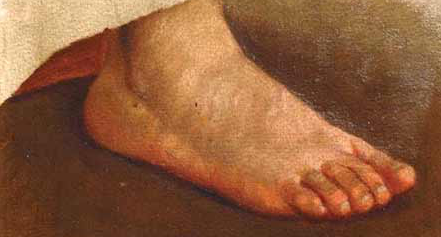| For Dr. Roger Green, in gratitude for his many years of Bible instruction at Gordon College. |
| Rather listen instead? |
| JP members can click the link below for an audio version of this essay.[*] Paid Content If you do not have a paid subscription, please consider registering as a Premium Member starting at $10/month (paid monthly) or only $5/month (paid annually): Register One Time Purchase Rather Than Membership  |
Shaking the dust from one’s feet is a powerfully visceral and evocative demonstration of disapproval.[1] As a seminary student I once performed a dust-shaking rite, based on my understanding at that time of Jesus’ command in the Gospels, when concluding a visit to the Flossenbürg extermination camp where Dietrich Bonhoeffer was executed by the Nazis on April 9, 1945. My visit to Flossenbürg was part of a week-long study tour in which we visited sites in Germany, Poland, and the Czech Republic that were of significance in Bonhoeffer’s life.[2] Flossenbürg was the last concentration camp we visited on the tour and shaking the dust from my feet was a way for me to express my rejection not only of horrible atrocities carried out by the Nazi regime, but also my repudiation of the anti-Judaism which has contaminated Christianity for so long and which helped make the atrocities perpetrated by the Nazis possible.
Paid Content
Premium Members and Friends of JP must be logged in to access this content: Login
If you do not have a paid subscription, please consider registering as a Premium Member starting at $10/month (paid monthly) or only $5/month (paid annually): Register
One Time Purchase Rather Than Membership
Rather than purchasing a membership subscription, you may purchase access to this single page for $1.99 USD. To purchase access we strongly encourage users to first register for a free account with JP (Register), which will make the process of accessing your purchase much simpler. Once you have registered you may login and purchase access to this page at this link:
- [1] For abbreviations and bibliographical references, see “Introduction to ‘The Life of Yeshua: A Suggested Reconstruction.’” ↩
- [2] Dietrich Bonhoeffer was a pastor in Germany who opposed Hitler and who eventually joined the resistance against the Nazi regime. ↩


























































Comments 4
Thank you! Good work, and yet…
The mention of Sodom is always heavy. Jesus calls it to mind elsewhere as in “the days of Lot” (Luk 17). The name calls to mind a juncture at which redemption is no longer possible. Paul points to Sodom as well in a roundabout way when he discusses those “who did not think it worthwhile to retain the knowledge of God” (Rom 1) and what characterizes them. Are there examples in traditions or writings from the first century in which Sodom was used in such a banal way, i.e. simply with regard to a lack of hospitality?
The widespread assumptions concerning some ritual of “dust-shaking” may very well be off the mark, but the meaning of Jesus’s words are what I’m after. Can we so easily explain away a statement like “Amen! I say to you, it will be more bearable for Sodom on that day than for that town.” ?
Author
Dear CJW,
I am interested in Jesus’ words too, and therefore I would challenge your assumption that denying someone hospitality is somehow banal or trivial. According to ancient sources hospitality is as serious as it gets.
As for the perception that Sodom was guilty of inhospitality, its roots are in the Genesis story, and already in Ezekiel 16:49 we read that the sin of Sodom was negligence toward the poor and needy. Josephus, a first-century C. E. witness, testifies to the tradition that hatred of foreigners and refusal to interact with outsiders characterized the people of Sodom (Ant. 1:194). In one way or another each of these sources on Sodom relates to the issue of hospitality.
For a fuller discussion about what Jesus’ comparison of a town that denied hospitality to his apostles to Sodom may have been getting at, check out Sending the Twelve: Conduct in Town, Comment to L119-120.
An informative and uplifting article — yet another beautiful example of the in-depth research you, David, and others do at Jerusalem Perspective, all of which enriches our reading of Scripture. Thank you, Joshua!
I think the author is on the right track here. If there was dust on the apostles’ feet, then we can assume it was still there because it had not been washed off. Also, shaking the said dust from their feet was all they were to do. “Lord, do you want us to call fire down from heaven to destroy them?” (Lk 9). Jesus’ answer was no.